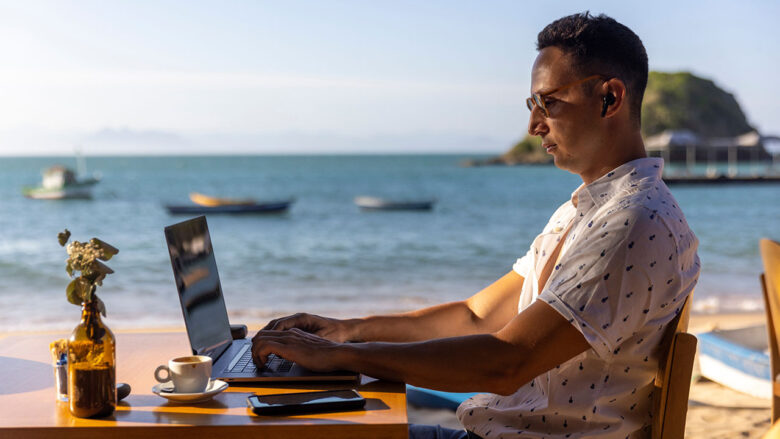With everything connected, working from home has never been easier, more convenient, or more appealing. Digital nomads, people who work online while traveling the world, are becoming an essential part of the modern workforce. With laptops and Wi-Fi, they can be anywhere, whether it’s a bustling city, a quiet countryside, or a remote location. While this lifestyle brings freedom, it also brings cyber threats. Working on an unfamiliar network, using a shared device, or connecting to public Wi-Fi can expose you to cyber risks. Cybersecurity when working abroad isn’t just about data security; it’s about work. This tutorial introduces some new, practical ways to help digital nomads protect their online data and feel safe while working from anywhere in the world.
Why Nomads Should Care about Cybersecurity:
Digital nomads sometimes choose to work from cafes, hotels, airports, or coworking spaces when working internationally. Internet connections in these places are often unsecured or poorly managed. These places are perfect for hackers to steal private data. If you can’t access your work files or your identity is stolen, you could lose out on revenue. It’s important to know that these dangers are real; many freelancers and remote workers have had their data stolen, fallen victim to ransomware attacks, or fallen victim to phishing scams. Understanding the importance of your digital footprint and taking steps to protect it can save you time, money, and stress.
Choosing Secure Networks Over Convenience:
One of the worst things a digital nomad can do is connect to a Wi-Fi network without checking its security. Free Wi-Fi at a cafe or airport might seem great, but these networks are often unsecured and can easily be hacked. Always choose a Wi-Fi network that has password protection, and, even better, ask the staff for the correct network name to avoid connecting to a fake network. Want more extensive protection? Consider purchasing a mobile hotspot that can access encrypted data. It doesn’t take much to keep your connection safe.
How VPNs Can Protect Digital Nomads:
One of the best ways to protect your online activity is to use a virtual private network (VPN). A VPN encrypts your network traffic, making it difficult for hackers and even your ISP to detect your activity. They also expose you to content that is only available in certain regions, which can be a problem if you work with clients or services from your home country. Choose a VPN with servers in multiple countries, a good privacy policy, and a no-logs policy. There are a number of free VPNs available, but they often have security holes. Simply paying a monthly fee to a trusted VPN provider can significantly improve your online security.
Keep Your Devices Secure and Up-to-Date:
Hackers can use old software to break into your computer. Many cyberattacks look for vulnerabilities in operating systems or programs that have not been updated. Enable automatic updates for all your devices, such as smartphones, tablets, and laptops. Make sure your antivirus software is working and up-to-date. Turn on your firewall and double-check before installing any unknown downloads or apps. To protect yourself from malicious threats when you’re thousands of miles away from home, keep your digital toolset in good shape.
How to Keep Your Passwords Safe:
Digital nomads often need to access many different accounts, such as their bank accounts, freelance platforms, communication tools, and more. Using the same password across multiple platforms or choosing weak password combinations like “123456” is very dangerous. Use a password manager to create and keep track of complex and unique passwords for each account. These programs protect your login information with encryption, and many also offer two-factor authentication. It’s also a good idea to change your password from time to time, especially after logging in from a public network or a device you don’t recognize.
Keep Your Work and Personal Data Safe:
Cloud storage and collaboration tools are essential for remote work. But uploading important files to free or unsecured storage sites can compromise your security. Choose a reliable cloud provider and make sure all files are encrypted end-to-end. Back up your data regularly to an external hard drive or a secure cloud platform to prevent theft or damage to your device. Don’t send important files via public email or other unsecured methods. Use a file-sharing platform that encrypts files so that only the people you specify can access them.
Being Aware of Local Cyber Laws and Norms:
Laws regarding the internet and internet freedom vary widely from country to country. Some countries closely monitor what people do online, block certain websites, and even punish users for using VPNs. Before traveling to a new country, familiarize yourself with the internet laws of that country and what you can and cannot do. Understanding these rules will help you avoid breaking the law and ensure that you don’t intentionally break them. Additionally, some countries have data-sharing agreements that can compromise your privacy if you’re not vigilant.
How to Recognize and Avoid Phishing Scams:
Phishing is a common type of cyberattack in which an attacker tricks you into giving up personal information by sending you a fake email, website, or message. If you’re a phisher, you may receive emails or messages from strangers or companies. Always check the sender’s email address, don’t click on links that look strange, and never give out personal information before confirming the source of the message. Make sure phishing detection is enabled and updated in your browser and security tools.
Use Multi-Factor Authentication for Added Security:
Multi-factor authentication (MFA) makes your accounts more secure by requiring two or more authentication methods before you can log in. If someone steals your password, they can’t access your data without a second method of verification, usually a code sent to your phone or email address. Use MFA whenever possible, especially for accounts related to money, communications, and cloud storage.
What to Do If You Get into Trouble Abroad?
Even if you take all the right steps, cyberattacks can still happen. If you think your accounts or devices have been compromised while you’re away, take immediate action. Disconnect from the internet immediately, change your passwords, and notify important contacts or platforms. Use a separate security device to seek help or report the incident. Also, prepare a list of emergency contacts in advance, including technical support lines and local government phone numbers. Acting quickly after discovering a problem can prevent further losses.
Conclusion:
The digital nomad lifestyle promises independence, adventure, and flexibility, but it also means you have to be more responsible when it comes to online safety. When you’re always on the go, you’re more at risk of online risks that can put your business, money, and personal data at risk. You can protect yourself and your work from most risks by using a reliable VPN, choosing a secure network, keeping track of your passwords, and staying up-to-date on digital best practices. Being proactive about online safety isn’t just a good idea—it’s an important part of a successful nomadic lifestyle. Make sure you develop good online habits when traveling to new places and experiencing new cultures so your travels are safer and more comfortable.
FAQs:
1. What’s the safest way to stay online when you’re away from home?
The best way is to use a VPN and a secure, password-protected Wi-Fi network. You can also use a personal mobile hotspot to have more control over your internet connection.
2. How often should I change my passwords when traveling?
It’s a good idea to change your most important passwords every three to six months, or whenever you connect to an unsecured network or suspect something is wrong.
3. Are free VPNs safe for people who work online?
Free VPNs often have restrictions that can compromise your privacy. It’s safer to invest in a commercial VPN service with high security.
4. What should I do if I think my data has been compromised?
Disconnect from the internet, change all passwords, install antivirus software, and use a secure method to inform the affected parties. You can tell the police or a cybersecurity expert what happened.
5. Is public Wi-Fi safe if I use a VPN?
VPNs can significantly improve the security of public Wi-Fi, but it is still advisable not to access important information or conduct financial activities on these networks unless necessary.




